鲁教版八年级上unit7 sectionB Reading:would you mind keeping your voice down?
文档属性
| 名称 | 鲁教版八年级上unit7 sectionB Reading:would you mind keeping your voice down? |
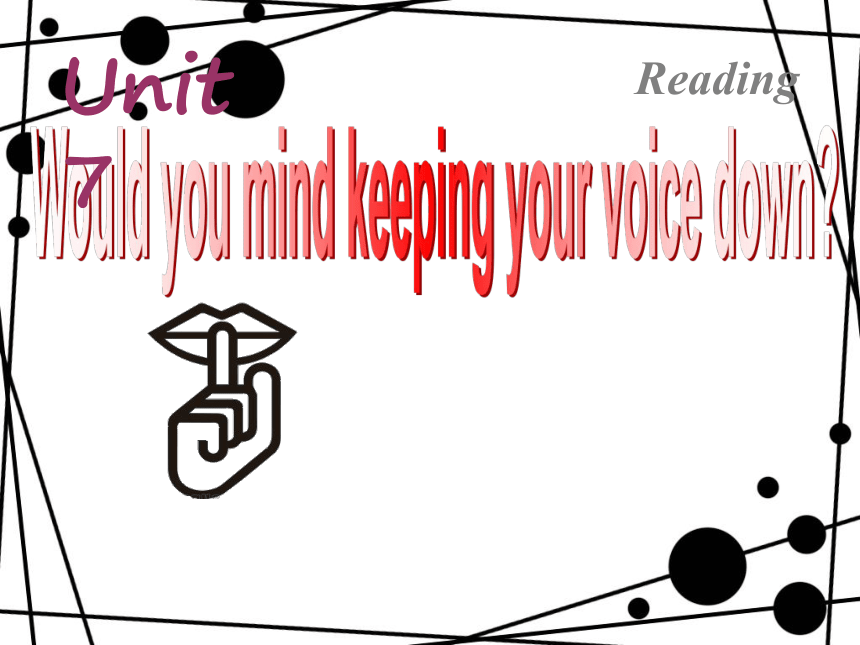
|
|
| 格式 | ppt | ||
| 文件大小 | 3.9MB | ||
| 资源类型 | 教案 | ||
| 版本资源 | 鲁教版(五四学制) | ||
| 科目 | 英语 | ||
| 更新时间 | 2011-03-14 00:00:00 | ||
图片预览

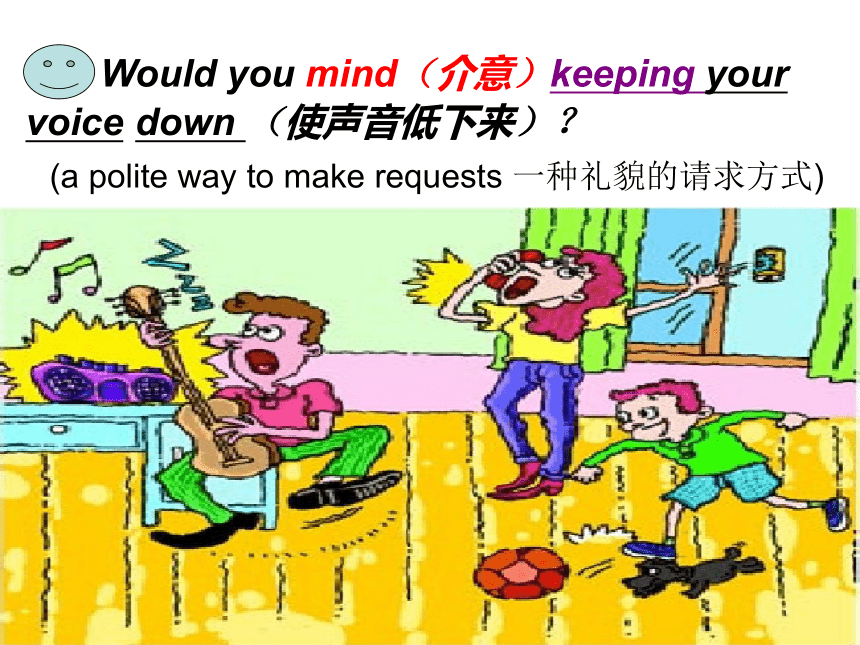
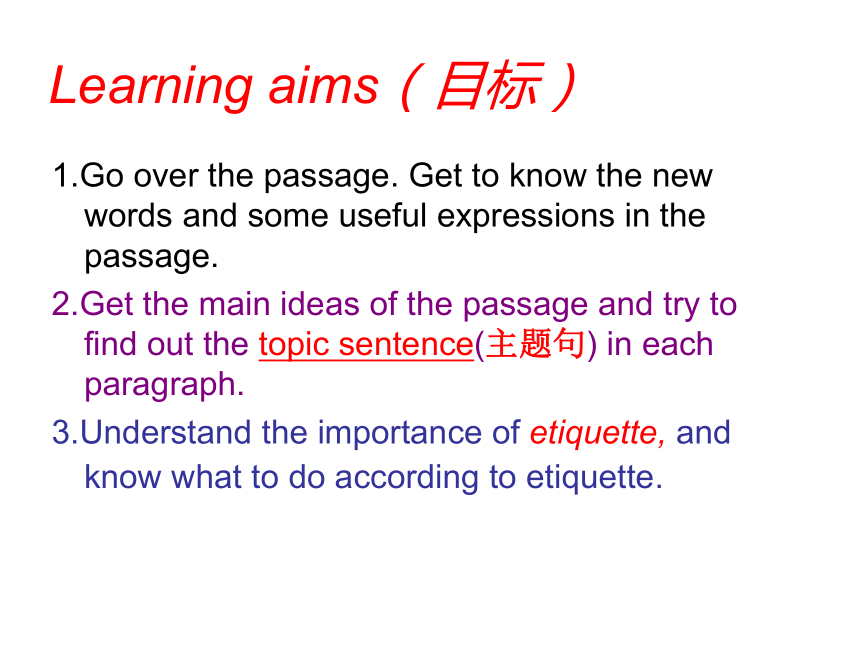
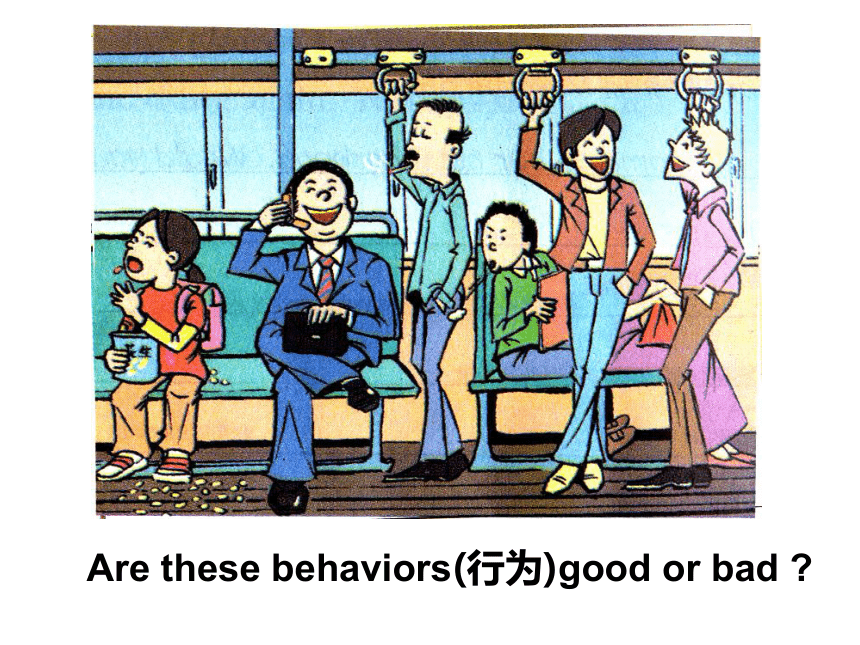
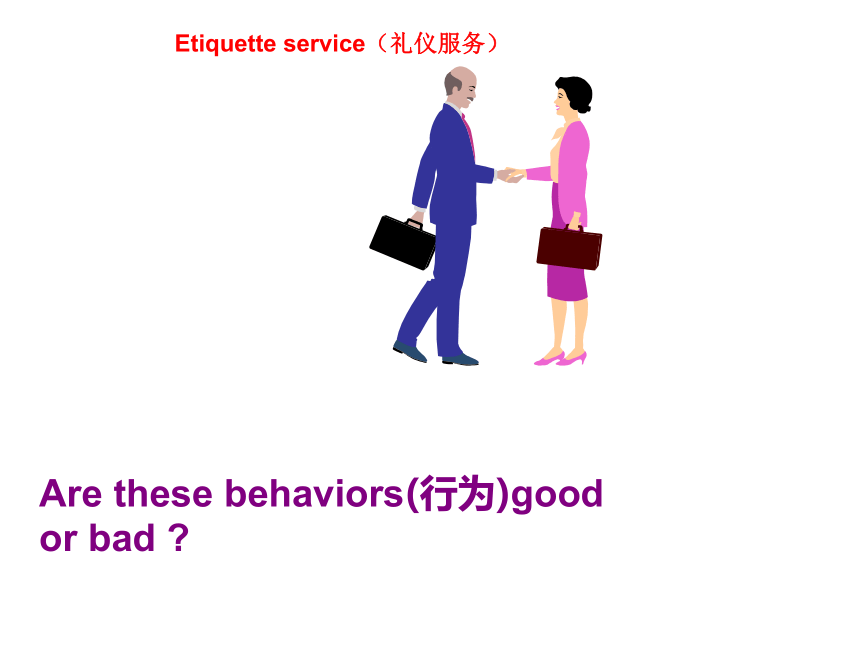
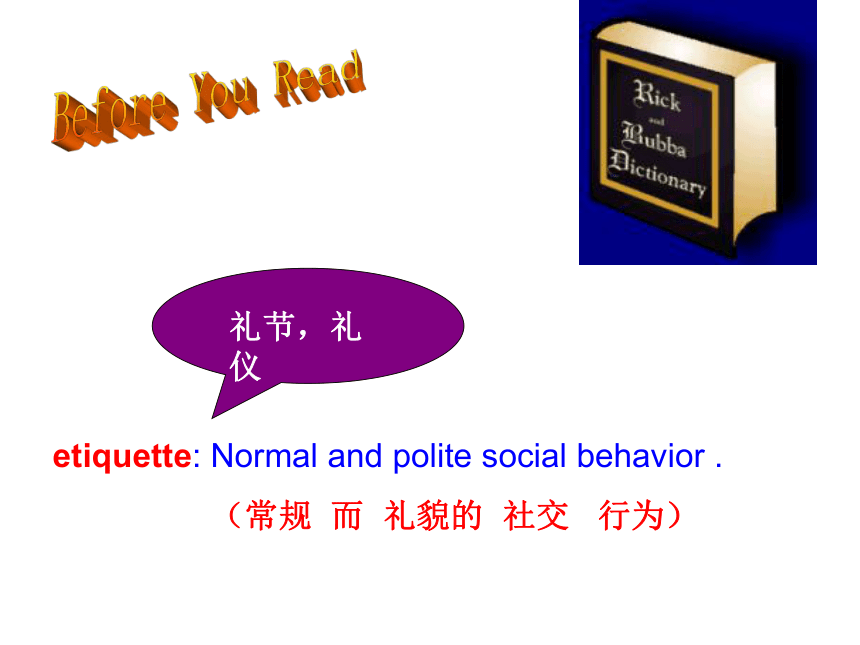
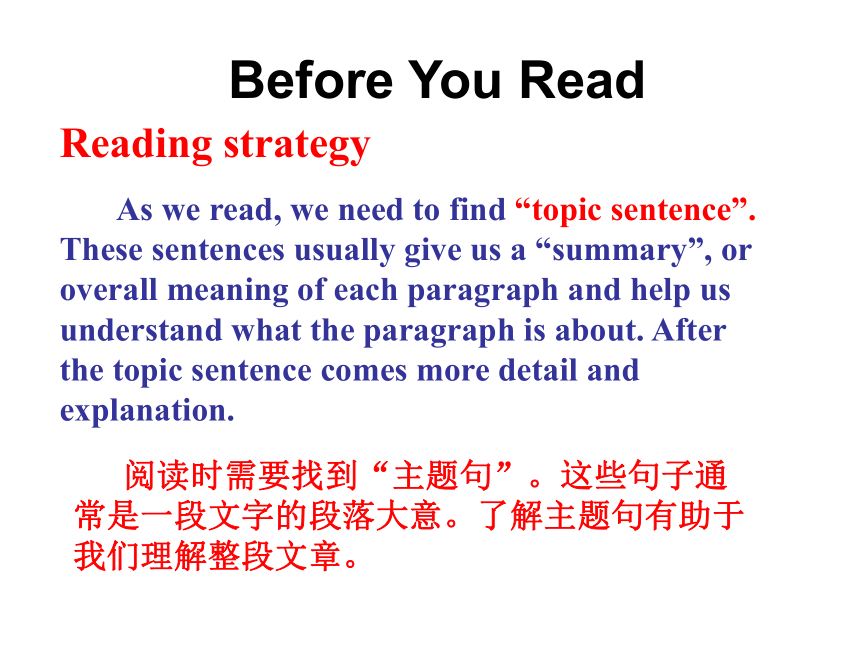
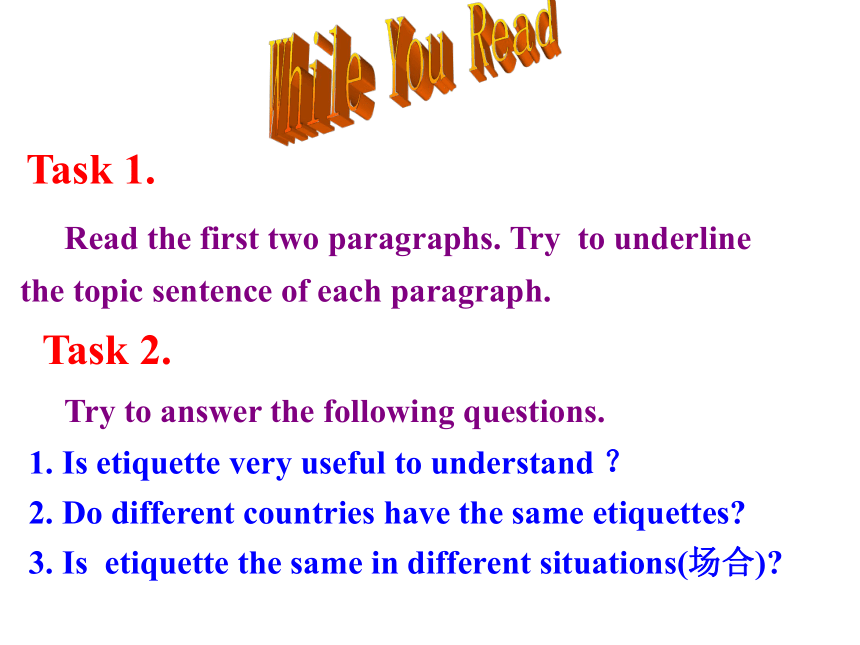
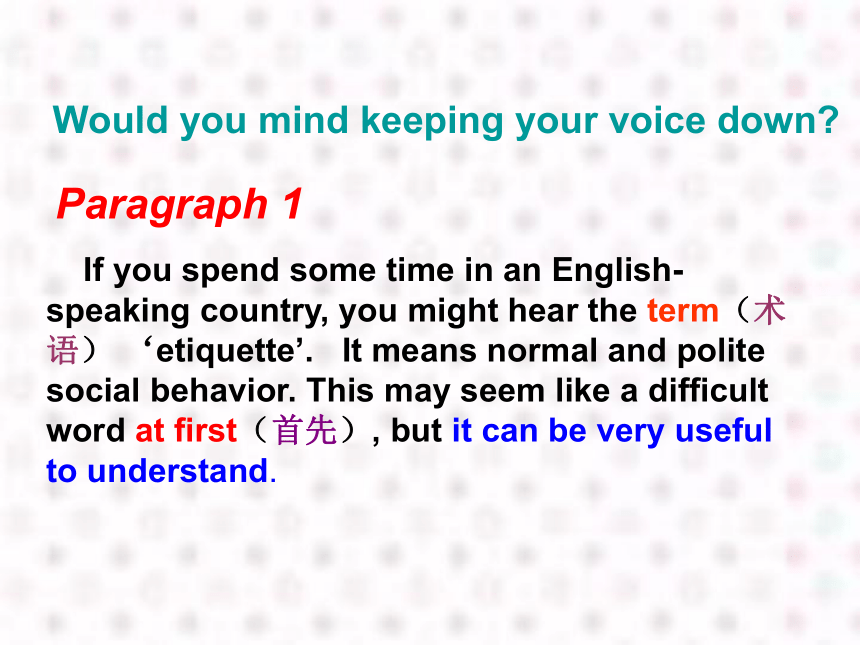
文档简介
(共23张PPT)
Unit 7
Reading
Would you mind(介意)keeping your voice down (使声音低下来)?
(a polite way to make requests 一种礼貌的请求方式)
Learning aims(目标)
1.Go over the passage. Get to know the new words and some useful expressions in the passage.
2.Get the main ideas of the passage and try to find out the topic sentence(主题句) in each paragraph.
3.Understand the importance of etiquette, and know what to do according to etiquette.
Are these behaviors(行为)good or bad
Are these behaviors(行为)good or bad
Etiquette service(礼仪服务)
etiquette: Normal and polite social behavior .
(常规 而 礼貌的 社交 行为)
礼节,礼仪
Before You Read
Reading strategy
As we read, we need to find “topic sentence”. These sentences usually give us a “summary”, or overall meaning of each paragraph and help us understand what the paragraph is about. After the topic sentence comes more detail and explanation.
阅读时需要找到“主题句”。这些句子通常是一段文字的段落大意。了解主题句有助于我们理解整段文章。
Task 1.
Read the first two paragraphs. Try to underline
the topic sentence of each paragraph.
Task 2.
Try to answer the following questions.
1. Is etiquette very useful to understand ?
2. Do different countries have the same etiquettes
3. Is etiquette the same in different situations(场合)
Paragraph 1
If you spend some time in an English-speaking country, you might hear the term(术语) ‘etiquette’. It means normal and polite social behavior. This may seem like a difficult word at first(首先), but it can be very useful to understand.
Would you mind keeping your voice down
Paragraph 2
Etiquette is not the same in every culture, or in every situation. For example, standing very close to the person you are talking with is quite common in some Asian (亚洲的) countries. However, if you do this in Europe(欧洲), some people might feel uncomfortable(不舒服的). Even in China, we all know that etiquette is not the same in all situations. Perhaps we think that talking loudly in our own homes is fine, but there are other places where talking loudly is not allowed(允许). For example, most people would agree that talking loudly in a library, a museum, or a movie theater is impolite(无礼的). Even if you are with your friends, it is better to keep your voice down in public(公共的) places. In fact, we should also take care(小心、当心) not to cough(咳嗽) or sneeze (打喷嚏)loudly in public.
Etiquette is different in different countries
in Asian countries
in Europe
If you stand very close to a person,
You will feel quite …
Some people might feel…
(common ).
(Uncomfortable).
in a library
at home
1. Talking loudly is fine/ OK at home
Talking loudly is not allowed/impolite in public.
2. It is better to keep your voice down
It is better not to cough or sneeze loudly in public places.
Etiquette is different in different situations.
Task 1.
Read the first two paragraphs. Try to underline
the topic sentence of each paragraph.
Task 2.
Try to answer the following questions.
1. Is etiquette very useful to understand ?
2. Do different countries have the same etiquettes
3. Is etiquette the same in different situations(场合)
Task 3
Read the next two paragraphs. Try to underline the topic sentence of each paragraph.
Task 4
Try to answer the following questions.
1. What could you say if someone cuts in front of you in line(插队)?
2. What could you say if someone is smoking on the bus
3. What could you say if someone is dropping litter(丢垃圾)?
Paragraph 3
If we see someone breaking the rules(违反规则) of etiquette, we may give them some suggestions politely (客气地). Perhaps one of the most polite ways is to ask someone, Would you mind doing this or Would you mind not doing that. For example, if someone cuts in front of you in line(插队), you could ask them, Sorry, would you mind joining the line If someone is smoking on the bus, we could ask, Excuse me, could you please put out(熄灭) that cigarette(香烟) People don’t usually like to be criticized(批评), so we have to be careful (小心、当心)how we do this.
Paragraph 4
Although rules of etiquette can often be different, some rules are the same almost everywhere in the world! For example, dropping (扔,丢)litter(垃圾) is almost never allowed. If you see someone you know doing this, you can ask them, would you mind picking it up(捡起)
Task 3
Read the next two paragraphs. Try to underline the topic sentence of each paragraph.
Task 4
Try to answer the following questions.
1. What could you say if someone cuts in front of you in line(插队)?
2. What could you say if someone is smoking on the bus
3. What could you say if someone is dropping litter(丢垃圾)?
---Would you mind joining the line
---Sure, I’ll do it right away.
Group 1
Role-Play
Group 2
---Would you mind not smoking
---Sorry, I won’t do it again.
cutting in line
smoking
True or False
1.In Europe, standing very close to the person you are talking with is quite common.
2.Talking loudly in public is allowed in China.
3.It is better to keep your voice down in public places.
4.“ Would you mind…” is a polite way to give people suggestions .
5.Rules of etiquette are always different.
T
T
F
F
F
China has always been a country of the etiquette.
Etiquette service(礼仪服务)
“Nice to meet you!”
“Take a seat, please!”
A poem of etiquette
Help each other ,
Help others more,
Be a nice girl and nice boy.
Try to be more polite,
Try not to break the rules of etiquette,
Be a nice girl and nice boy.
根据生活情景,写一封建议或劝阻别人的便笺。(用上“Would you mind… ”或“Would you mind not doing…”句型)
Unit 7
Reading
Would you mind(介意)keeping your voice down (使声音低下来)?
(a polite way to make requests 一种礼貌的请求方式)
Learning aims(目标)
1.Go over the passage. Get to know the new words and some useful expressions in the passage.
2.Get the main ideas of the passage and try to find out the topic sentence(主题句) in each paragraph.
3.Understand the importance of etiquette, and know what to do according to etiquette.
Are these behaviors(行为)good or bad
Are these behaviors(行为)good or bad
Etiquette service(礼仪服务)
etiquette: Normal and polite social behavior .
(常规 而 礼貌的 社交 行为)
礼节,礼仪
Before You Read
Reading strategy
As we read, we need to find “topic sentence”. These sentences usually give us a “summary”, or overall meaning of each paragraph and help us understand what the paragraph is about. After the topic sentence comes more detail and explanation.
阅读时需要找到“主题句”。这些句子通常是一段文字的段落大意。了解主题句有助于我们理解整段文章。
Task 1.
Read the first two paragraphs. Try to underline
the topic sentence of each paragraph.
Task 2.
Try to answer the following questions.
1. Is etiquette very useful to understand ?
2. Do different countries have the same etiquettes
3. Is etiquette the same in different situations(场合)
Paragraph 1
If you spend some time in an English-speaking country, you might hear the term(术语) ‘etiquette’. It means normal and polite social behavior. This may seem like a difficult word at first(首先), but it can be very useful to understand.
Would you mind keeping your voice down
Paragraph 2
Etiquette is not the same in every culture, or in every situation. For example, standing very close to the person you are talking with is quite common in some Asian (亚洲的) countries. However, if you do this in Europe(欧洲), some people might feel uncomfortable(不舒服的). Even in China, we all know that etiquette is not the same in all situations. Perhaps we think that talking loudly in our own homes is fine, but there are other places where talking loudly is not allowed(允许). For example, most people would agree that talking loudly in a library, a museum, or a movie theater is impolite(无礼的). Even if you are with your friends, it is better to keep your voice down in public(公共的) places. In fact, we should also take care(小心、当心) not to cough(咳嗽) or sneeze (打喷嚏)loudly in public.
Etiquette is different in different countries
in Asian countries
in Europe
If you stand very close to a person,
You will feel quite …
Some people might feel…
(common ).
(Uncomfortable).
in a library
at home
1. Talking loudly is fine/ OK at home
Talking loudly is not allowed/impolite in public.
2. It is better to keep your voice down
It is better not to cough or sneeze loudly in public places.
Etiquette is different in different situations.
Task 1.
Read the first two paragraphs. Try to underline
the topic sentence of each paragraph.
Task 2.
Try to answer the following questions.
1. Is etiquette very useful to understand ?
2. Do different countries have the same etiquettes
3. Is etiquette the same in different situations(场合)
Task 3
Read the next two paragraphs. Try to underline the topic sentence of each paragraph.
Task 4
Try to answer the following questions.
1. What could you say if someone cuts in front of you in line(插队)?
2. What could you say if someone is smoking on the bus
3. What could you say if someone is dropping litter(丢垃圾)?
Paragraph 3
If we see someone breaking the rules(违反规则) of etiquette, we may give them some suggestions politely (客气地). Perhaps one of the most polite ways is to ask someone, Would you mind doing this or Would you mind not doing that. For example, if someone cuts in front of you in line(插队), you could ask them, Sorry, would you mind joining the line If someone is smoking on the bus, we could ask, Excuse me, could you please put out(熄灭) that cigarette(香烟) People don’t usually like to be criticized(批评), so we have to be careful (小心、当心)how we do this.
Paragraph 4
Although rules of etiquette can often be different, some rules are the same almost everywhere in the world! For example, dropping (扔,丢)litter(垃圾) is almost never allowed. If you see someone you know doing this, you can ask them, would you mind picking it up(捡起)
Task 3
Read the next two paragraphs. Try to underline the topic sentence of each paragraph.
Task 4
Try to answer the following questions.
1. What could you say if someone cuts in front of you in line(插队)?
2. What could you say if someone is smoking on the bus
3. What could you say if someone is dropping litter(丢垃圾)?
---Would you mind joining the line
---Sure, I’ll do it right away.
Group 1
Role-Play
Group 2
---Would you mind not smoking
---Sorry, I won’t do it again.
cutting in line
smoking
True or False
1.In Europe, standing very close to the person you are talking with is quite common.
2.Talking loudly in public is allowed in China.
3.It is better to keep your voice down in public places.
4.“ Would you mind…” is a polite way to give people suggestions .
5.Rules of etiquette are always different.
T
T
F
F
F
China has always been a country of the etiquette.
Etiquette service(礼仪服务)
“Nice to meet you!”
“Take a seat, please!”
A poem of etiquette
Help each other ,
Help others more,
Be a nice girl and nice boy.
Try to be more polite,
Try not to break the rules of etiquette,
Be a nice girl and nice boy.
根据生活情景,写一封建议或劝阻别人的便笺。(用上“Would you mind… ”或“Would you mind not doing…”句型)
同课章节目录
- Unit 1 Could you please clean your room?
- Section A
- Section B
- Unit 2 Why don't you talk to your parents?
- Section A
- Section B
- Unit 3 What were you doing when the rainstorm came
- Section A
- Section B
- Unit 4 An old man tried to move the mountains.
- Section A
- Section B
- Unit 5 What's the highest mountain in the world?
- Section A
- Section B
- Unit 6 Have you read Treasure Island yet?
- Section A
- Section B
- Unit 7 Have you ever been to a museum?
- Section A
- Section B
- Unit 8 I've had this bike for three years.
- Section A
- Section B
